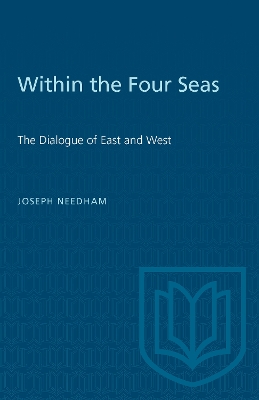Canadian University Paperbooks
1 primary work • 2 total works
Book 226
The historical civilization of China is, with the Indian and European-Semitic, one of the three greatest in the world, yet only relatively recently has any enquiry been begun into its achievements in science and technology. Between the first and fifteenth centuries the Chinese were generally far in advance of Europe and it was not until the scientific revolution of the Renaissance that Europe drew ahead. Throughout those fifteen centuries, and ever since, the West has been profoundly affected by the discoveries and invention emanating from China and East Asia.
In this series of essays and lectures, Joseph Needham explores the mystery of China's early lead and Europe's later overtaking.
Joseph Needham is one of the world’s experts on China and her culture, especially the history of science and technology in that great civilization. No one is better qualified to write about the contrasts and similarities between China and Europe, their mutual relations, and the ideas they have had of each other.
Reprinted here are some of the most significant of his essays, lectures and broadcasts on these subjects, together with some more personal thoughts stimulated by his own travels and experience in China, including a number of poems that he has on occasion felt moved to write there. HE lived and worked in China all through the Second World War, and has revisited the country for considerable periods several times since the revolution. Dr Needham reminds us in the West of the great debt we owe to China, not only for her scientific and technical achievements which have been a part of the European heritage for so long that we assume them to be our own, but also for much enlightenment from the rationality of her culture. He also discusses the valuable social and intellectual influences which have for centuries flowed to Europe from South as well as East Asia. He suggests that this century’s happenings in the Chinese Republic are a natural development of all Chinese history, not a deviation from it.
The present Master of Caius has had an unusual intellectual history. Trained in the biomedical of Frederick Gowland Hopkins at Cambridge, he made his name with ‘Chemical Embryology’ and ‘Biochemistry and Morphogenesis’ as a scientific worker on the borderline of physiological chemistry and the morphological sciences. This was the field of work for which he was elected into the Fellowship of the Royal Society. And those were the years in which we published his books of essays ‘Time, the Refreshing River’ and ‘History is on Our Side.’
But after several decades a new influence appeared in the form of certain young Chinese scientists who came to work with him and his colleagues in Cambridge; through them he acquired the beginnings of his knowledge of the language and culture of China. When the Second World War made China and Britain allies, Joseph Needham was asked to lead a mission of scientific and technological liaison which gave him four years of life in China, ranging widely in the course of his work through most of the historic provinces. He was thus able to meet a host of Chinese scientists, engineers and doctors who were able to give him an orientation into the history of science and technology in their own culture; and he began to build up a unique working library of the Chinese books necessary for the writing of the work on this whole subject which he started when he returned to Cambridge in 1948. Since the communist revolution he has revisited China thrice, in 1952, 1958, and 1964. The Master of Caius is thus a man who has a right to speak about traditional Chinese culture, its present position, and its probable future development. In this book he reprints a number of addresses and lectures given from time to time during the passion twenty-five years; but appropriately besides (since all Chinese scholars have always been poets) he adds a number of poems which in his various periods of life in China he has on occasion felt moved to write.

